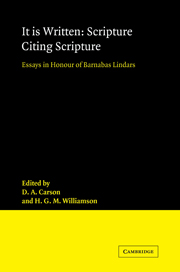3 - Prophecy
Published online by Cambridge University Press: 16 January 2010
Summary
The Old Testament prophets (i.e. the latter prophets) are rich in inner-biblical interpretation. Sometimes they allude to actual biblical texts but in other cases they take up themes from the tradition which was later to become embedded in the biblical text. In considering this large topic I shall discuss first the prophets and the law, then go on to a consideration of the creation and other primeval traditions, historical and legendary traditions, the prophets and the Psalms, and prophets quoting earlier prophets, and finally I shall deal with the subject of relectures.
THE PROPHETS AND THE LAW
Traditionally the law was understood as something which preceded the prophets and which was presupposed in the prophetic proclamation. With the rise of critical scholarship in the nineteenth century, as exemplified in the work of Wellhausen, the order was reversed so that the written law came to be seen as a development subsequent to the work of the pre-exilic prophets. Accordingly, the originality of the prophets became emphasised. In the present century, however, there has been a general acceptance that, though the final form of the Priestly legislation is relatively late, the tradition of law in ancient Israel antedates the prophets. Although the prophets were not constantly quoting the letter of the law, it does appear that they were indebted to the tradition of law. Hosea, for example, could declare, ‘Were I to write for him my laws by ten thousands, they would be regarded as a strange thing’ (Hos. 8:12).
As for the decalogue, there are only two passages in the prophets which appear to contain a direct echo of it.
Information
- Type
- Chapter
- Information
- It Is Written: Scripture Citing ScriptureEssays in Honour of Barnabas Lindars, SSF, pp. 39 - 55Publisher: Cambridge University PressPrint publication year: 1988
Accessibility standard: Unknown
Why this information is here
This section outlines the accessibility features of this content - including support for screen readers, full keyboard navigation and high-contrast display options. This may not be relevant for you.Accessibility Information
- 2
- Cited by
